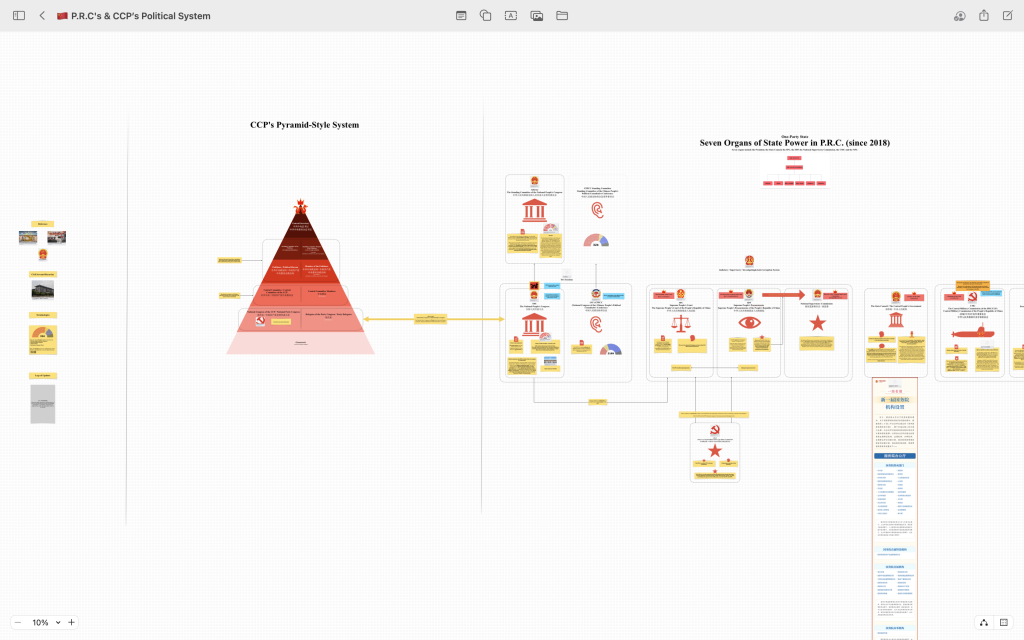SOEs(State-Owned Enterprises) of the P.R.C.
Definition of SOEs
In narrow terms, SOEs are state-owned assets performed the investor’s responsibilities and supervised by the State-Owned Assets Supervision and Administration Commission of the State Council (SASAC). According the list released by the SASAC, there are 97 SOEs showed at the link.
In broad terms, more than 97 SOEs are included, including Enterprises managed by other institutions directly under the State Council(List of Central Financial Enterprises): mostly, they’re financial SOEs regulated by the Ministry of Finance(MOF), Enterprises operated by the military or armed police forces, such as those in the defense industry, and other enterprises where the central government holds the majority of investment or control.
Entities Capable of Carrying Out Duties and Obligations of the Representative of the state as the Owner or Shareholder or Investor of SOEs
Before diving into this, one thing should be made clear that shares & ownerships and regulatory authority or operation entities are different topics. If we don’t recognize this, you may see many entities showing in discussing SOEs. Specifically, in this subtopic, we focus on entities capable of holding ownerships of SOEs.
The State-owned Assets Supervision and Administration Commission of the State Council (SASAC) is a special commission of the People’s Republic of China, directly under the State Council. It was founded in 2003 through the consolidation of various other industry-specific ministries. SASAC is responsible for managing state-owned enterprises (SOEs), including appointing top executives and approving any mergers or sales of stock or assets, as well as drafting laws related to SOEs.
State-Owned Assets Supervision and Administration Commission of the State Council
Considering the politics of the P.R.C. and operations of SOEs in reality, the SASAC of the State Council and the SASAC of the local government should be separately discussed in this topic. Within the pyramid structure, the local government level of SASACs are, indeed, responsible for the central government level, whereas, local governments have more self-decision rights in economic and public affairs, aligned with the political framework of the P.R.C. proposed by Economist Chenggang Xu, called regionally decentralized authoritarianism (RDA) regime. This is one of the foundation of rapid economic development of the P.R.C. in the recent past decades, because this provides competition ground between local governments. Without competition, it’s easily assumed inefficient operation of local governments and economy. More than that, the words “央企”(Centrally Owned SOEs) and ”国企”(State-Owned Enterprises) also prove the essence of division of central-level and local-level, as ”国企”(State-Owned Enterprises) can be centrally owned or locally owned or Central-Local Mixed.
| Aspect | SASAC (of the Local Government) 国资委, 国务院国有资产监督管理委员会 | SASAC (of the State Council) 地方国资委 | MOF (Ministry of Finance) 国务院财政部 |
| Scope of Oversight | Local SOEs owned and controlled by municipal or provincial governments. | Central SOEs (nationally strategic industries and enterprises). | Primarily financial SOEs and state-owned financial institutions. |
| Type of Enterprises Managed | Local infrastructure, utilities, public services, and regional development enterprises. | Enterprises in energy, transportation, telecommunications, defense, and other key sectors of the national economy. | Banks, insurance companies, asset management firms, and sovereign wealth funds. |
| Key Responsibilities | 1. Represent local governments as the owner of local SOEs. 2. Manage regional SOEs to promote local economic development. | 1. Represent the central government as the owner of central SOEs. 2. Ensure national-level SOEs operate efficiently and align with state economic strategies. | 1. Act as the owner of state financial institutions. 2. Oversee the financial performance and ensure capital efficiency in financial SOEs. |
| Ownership Mechanism | Direct ownership of local SOEs via local government-controlled entities or SASACs. | Direct ownership of central SOEs under the supervision of SASAC of the State Council. | Ownership through intermediaries like China Investment Corporation (CIC) and Central Huijin Investment Ltd. |
| Examples of SOEs | – Shanghai Electric Group (Shanghai SASAC). – Guizhou Moutai (Guizhou SASAC). | – China Mobile, China National Petroleum Corporation (CNPC), State Grid Corporation of China. | – Industrial and Commercial Bank of China (ICBC), China Life Insurance, China Investment Corporation (CIC). |
| Industry Focus | Local economic development and infrastructure projects. | National strategic industries critical to economic security and growth. | Financial sector, including banks, insurance, and capital markets. |
| Revenue Source | Dividends from local SOEs, local taxation revenues. | Dividends from central SOEs, profits from national-level operations. | Dividends from financial SOEs, investment returns from sovereign wealth funds. |
| Role in SOE Reform | Implement regional SOE reforms to align with local needs. | Drive national-level SOE reforms, especially in areas like market competition and mixed-ownership reforms. | Oversee financial reforms and ensure SOEs in the financial sector align with national economic strategies. |
| Connection to State Budget | Typically not directly tied to the national budget but may receive transfers from the central government. | A portion of central SOE profits goes into the national budget through the SASAC. | State financial SOEs contribute directly to the national budget, and MOF allocates funds for national financial policies. |
Take ICBC, the largest bank in terms of market value as an example.
Its ownership composition is as follows:
- Central Huijin Investment Ltd.: As of 2023, Central Huijin, a wholly-owned subsidiary of China Investment Corporation (CIC), holds approximately 34.71% of ICBC’s shares. Central Huijin acts on behalf of the state to invest in key financial enterprises.
- Ministry of Finance (MOF) of the People’s Republic of China: The MOF holds about 31.14% of ICBC’s shares, representing the state’s direct financial interest in the bank.
- National Council for Social Security Fund (SSF): The SSF owns approximately 3.46% of ICBC’s shares, serving as a strategic reserve fund to support social security expenditures.
- Public and Institutional Investors: The remaining shares are held by various domestic and international public and institutional investors, including those trading on the Shanghai and Hong Kong stock exchanges.
Meanwhile, the Central Huijin Investment Ltd. is fully owned by China Investment Corporation which, further, is fully owned by MOF. Therefore, the MOF, in the end, controls 34.71% plus 31.14% of its shares, holding most of its shares on MOF’s hands.
To recap, there’re only three entities that legitimately carry out duties and obligations of the representative of the P.R.C. as the owners or shareholders of SOEs: the SASAC of the State Council, the SASACs of the local governments, and the MOF. And, of course, the SASACs of the local governments are sub-departments of that of the State council.
Entities Capable of Carrying out Duties and Obligations of Regulatory Authorities of SOEs
As we discuss before, in the terms of investment, there’re only three entities involved. Whereas, in terms of regulations, more entities are involved, especially in certain industries, such as military or armed police systems. The followings are some of the entities, but not all.
| Entity | Scope of Regulation | Examples of Regulated SOEs |
| National Energy Administration (NEA) | Supervises energy industries, including electricity, coal, oil, and renewables. | State Grid Corporation, China National Petroleum Corporation (CNPC), China Huaneng Group. |
| China Banking and Insurance Regulatory Commission (CBIRC) | Regulates banking and insurance industries, ensuring financial stability and risk control. | Industrial and Commercial Bank of China (ICBC), China Life Insurance, China Construction Bank (CCB). |
| China Securities Regulatory Commission (CSRC) | Oversees securities markets, including publicly listed SOEs and fund management companies. | CITIC Securities, listed SOEs like PetroChina and Sinopec. |
| Ministry of Industry and Information Technology (MIIT) | Regulates telecommunications, high-tech manufacturing, and software industries. | China Mobile, China Unicom, Huawei (state-influenced). |
| National Development and Reform Commission (NDRC) | Guides SOEs in major economic projects, infrastructure development, and industrial policy implementation. | China Railway Group, China State Construction Engineering Corporation. |
| State Administration for Market Regulation (SAMR) | Ensures market competition, fair trade, and consumer protection, regulating SOEs’ compliance with antitrust laws. | SOEs involved in domestic trade, including food processing and healthcare. |
| Ministry of Transport (MOT) | Oversees logistics, ports, and transportation infrastructure SOEs. | China COSCO Shipping, China Communications Construction Company (CCCC). |
| National Health Commission (NHC) | Regulates healthcare and pharmaceutical SOEs to ensure compliance with health policies and standards. | Sinopharm, China National Pharmaceutical Group. |
| Ministry of Natural Resources (MNR) | Regulates resource exploration, land use, and environmental compliance. | China National Offshore Oil Corporation (CNOOC), Sinochem Group. |
| State Administration of Science, Technology and Industry for National Defense (SASTIND) | Supervises military-related industries and dual-use technologies. | China Aerospace Science and Technology Corporation (CASC), Norinco. |
| Ministry of Culture and Tourism (MCT) | Guides cultural and tourism-related SOEs, ensuring alignment with national cultural strategies. | China Culture Media Group, China Travel Service (CTS). |
| Central Commission for Discipline Inspection (CCDI) | Investigates corruption and misconduct in SOEs as part of anti-corruption efforts. | All state-owned enterprises. |
Categorized by its Ownership of Local or Central Government
- Centrally Owned SOEs(中央企业)
- Locally Owned SOEs (地方国有企业)
- Central-Local Mixed Ownership Enterprise or Central-Local Joint Venture (中央地方混合所有制企业)
Borrowed phrase from economist Chenggang Xu, the P.R.C. implemented regionally decentralized authoritarianism(RDA), which means central government in the P.R.C. maintains an authoritarian regime while delegating substantial administrative and economic authority to local governments, allowing local experimentation, economic competition, and development within a centrally controlled framework. The phenomena of SOEs just reflect this theory.
Categorized by its Ownerships of Capitals(State-Owned, Public Shares, Private Shares, Foreign Shares)
| SOEs | Chinese | State-Owned Shares | Public Shares | Private Shares | Foreign Shares | Examples |
| Fully State-Owned | 全部国有企业 | 100% | 0% | 0% | 0% | 1. 国家电网 SGCC, State Grid Corporation of China 2. 中国石油 CNPC, China National Petroleum Corporation |
| Majority State-Owned Listed | 国有控股上市企业 | >50% | <50% | 0% | Optional | 中国工商银行 ICBC, Industrial and Commercial Bank of China State-Owned Shares: 66% Public Shares: 34% |
| Hybrid Ownership | 混合所有制企业 | <50% | >0% | >0% | Optional | \ |
| Foreign Joint Venture SOEs | 外资合资企业 | >50% | 0% | 0% | <50% | 上汽通用 SAIC-GM |
| Partially Privatized SOEs | 部分私人化企业 | <50% | >0% | >50% | 0% | 海尔集团 Haier Group |
| Fully Publicly Listed | 全部公众上市企业 | 0% | 100% | 0% | 0% | 中国中车 CRRC Corporation 100% Public Shares, but still indirectly controls by the State |
Categorized by its Control Rights of the State
| Chinese | Control Right Features | |
| Wholly State-Owned Enterprises | 全资国有企业 | 100% State-Owned, Fully Controlled |
| Majority State-Owned Enterprises | 控股国有企业 | State Holds Over 50%, Forms Absolute Control |
| Minority State-Owned Enterprises | 参股国有企业 | State Holds Less Than 50% but Retains Significant Influence |
| Jointly Controlled Enterprises | 共同控制的国有企业 | State Shares Control with Other Shareholders |
| Indirectly Controlled Enterprises | 间接控制的国有企业 | State Controls the Enterprise Indirectly Through a Parent Company |
| De Facto Controlled Enterprises | 实际控制的国有企业 | State Forms De Facto Control Through Agreements or Capital Arrangements |



